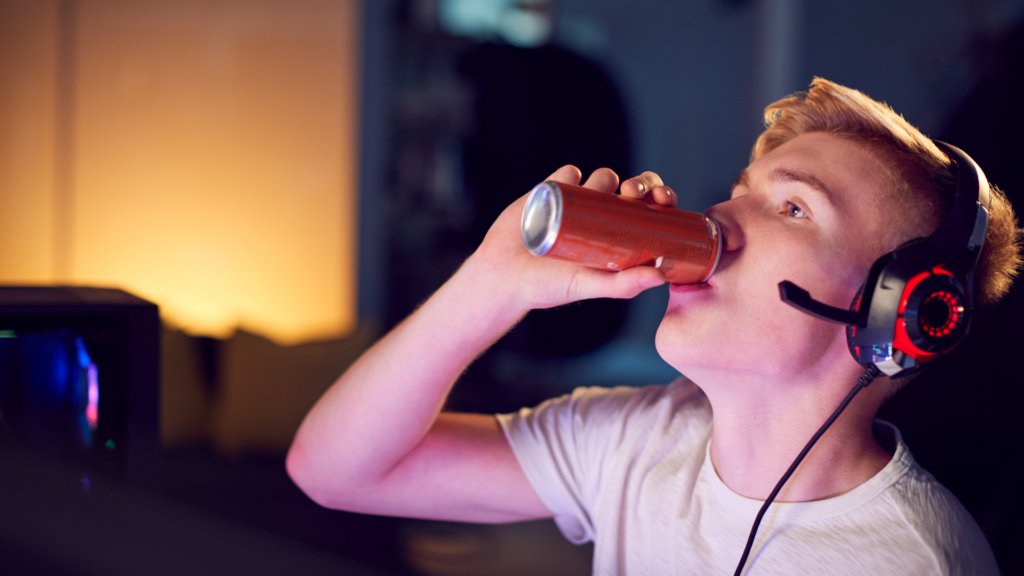In a world where energy Caffeine drinks and late-night study sessions have become the norm, it’s no surprise that adolescents are turning to coffee for that extra jolt of energy. But what’s driving this trend, and what are the potential consequences?

Table of Contents
Introduction
In recent years, there’s been a noticeable trend: teenagers turning to coffee for a quick energy boost. With 18% of adolescents reportedly consuming Caffeine regularly, this phenomenon has sparked concern among parents, educators, and health professionals. What’s driving this surge in teen caffeine consumption, and what are the implications for their health and well-being?
The Rise of Teen Coffee Consumption
Recent studies reveal that nearly one in five teenagers drinks coffee, a significant rise from previous decades. This increase can be attributed to various factors, from heightened academic pressures to the cultural allure of coffee. But what exactly is fueling this trend?
ALSO READ : The Sweet Truth: Does Sugar Really Lower Testosterone for Up to 2 Hours?
Reasons Behind the Surge
Academic Pressure
Today’s teens face unprecedented academic demands. With rigorous coursework, extracurricular activities, and college preparations, they often find themselves burning the midnight oil. Coffee becomes a quick fix, helping them stay awake and alert during late-night study sessions.
Social Influence and Culture
Coffee isn’t just a beverage; it’s a social activity. Teenagers often gather at coffee shops, sharing lattes and frappuccinos. Moreover, social media platforms are flooded with images of teens enjoying their favorite brews, further normalizing coffee consumption.

Easy Accessibility
Coffee shops have mushroomed in every nook and cranny, and schools often have coffee available in cafeterias and vending machines. This easy accessibility makes it simple for teens to get their caffeine fix whenever they need it.
Health Implications of Caffeine on Teens
While coffee can provide a temporary energy boost, it’s important to consider its health implications, especially for teenagers whose bodies and brains are still developing.
Short-term Effects of Caffeine
In the short term, coffee can increase alertness and improve concentration. However, it can also lead to sleep disruptions, making it harder for teens to get the rest they need.
Long-term Health Risks
The long-term effects of coffee on adolescents are particularly concerning. Regular consumption can interfere with brain development, potentially leading to issues such as anxiety, mood swings, and even addiction.
Psychological Impact
Anxiety and Mood Swings
Teens are already susceptible to mood swings and anxiety due to hormonal changes. can exacerbate these issues, leading to heightened feelings of stress and irritability.
Dependency and Withdrawal Symptoms
Regular coffee consumption can lead to dependency, where teens feel they cannot function without their daily dose of coffee. When they try to cut back, they may experience withdrawal symptoms like headaches, fatigue, and irritability.
Parental and Educational Roles
Parents and educators play a crucial role in addressing this issue. By monitoring coffee intake and providing guidance, they can help teens make healthier choices. Schools can also implement educational programs about the effects of caffeine.
Alternatives to Coffee for Energy
There are several healthier alternatives to coffee that can help teens maintain their energy levels without the adverse effects of caffeine.
Healthier Beverage Options
Water, herbal teas, and natural fruit juices can provide hydration and nutrients that boost energy. Smoothies made with fruits and vegetables are also excellent choices.
Lifestyle Changes for Better Energy Management
Encouraging teens to get regular exercise, maintain a balanced diet, and establish a consistent sleep schedule can naturally enhance their energy levels and overall well-being.

Success Stories and Positive Examples
Some teens have successfully reduced their coffee consumption by adopting healthier habits. Schools promoting these changes have also seen positive results, with students reporting improved focus and energy.
Expert Opinions and Recommendations
Health professionals recommend that teens limit their intake to no more than 100 mg per day, roughly equivalent to one cup of coffee. They also advise parents to monitor their children’s caffeine consumption and encourage healthier alternatives.
As Per the whole summery ,The teen coffee crisis is a growing concern that requires attention from parents, educators, and health professionals. By understanding the reasons behind the surge in coffee consumption and its potential health risks, we can take steps to guide teens towards healthier habits and ensure their well-being.
FAQs
What is the recommended daily caffeine intake for teenagers?
Health professionals suggest that teenagers should consume no more than 100 mg of caffeine per day, which is approximately one cup of coffee.
Are energy drinks worse than coffee for teens?
Yes, energy drinks often contain higher levels of caffeine and added sugars, which can be more harmful than coffee for teenagers.
How can parents help their teens reduce caffeine consumption?
Parents can help by educating their teens about the risks of caffeine, providing healthier alternatives, and setting a good example with their own consumption habits.
What are some signs of caffeine addiction in teenagers?
Signs of caffeine addiction include needing coffee to start the day, experiencing withdrawal symptoms like headaches and irritability, and feeling unable to concentrate without caffeine.
Can caffeine consumption affect academic performance in teens?
Yes, while coffee can temporarily boost alertness, it can also lead to sleep disturbances and increased anxiety, ultimately hindering academic performance.



